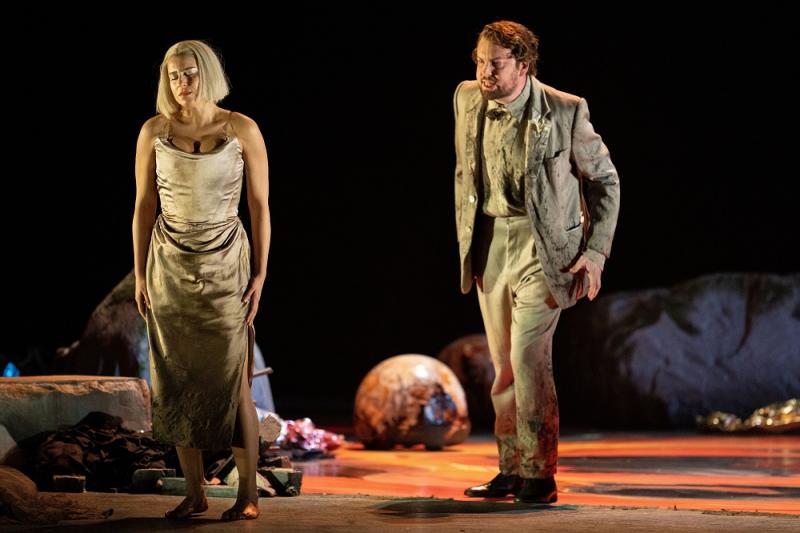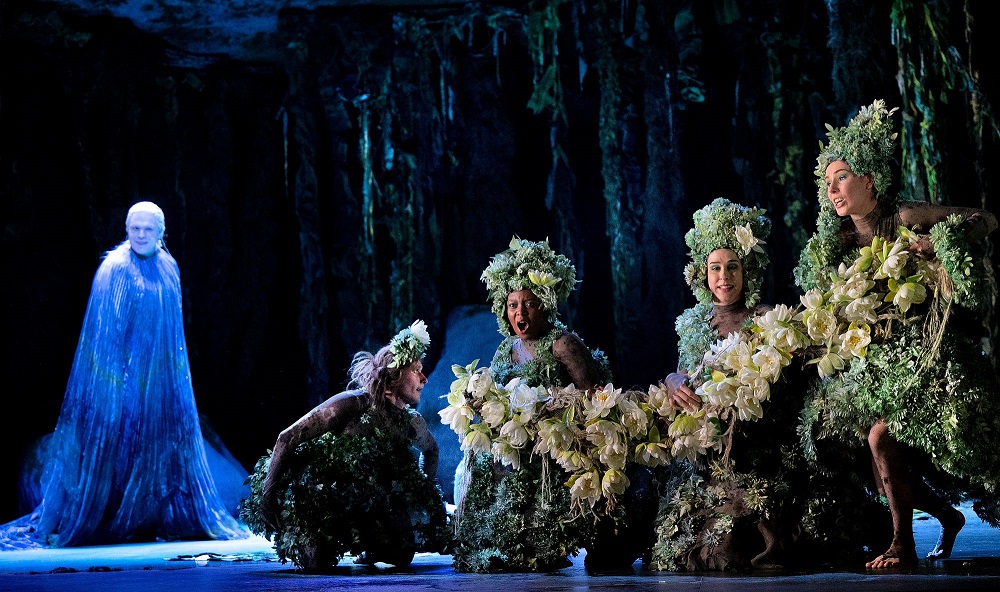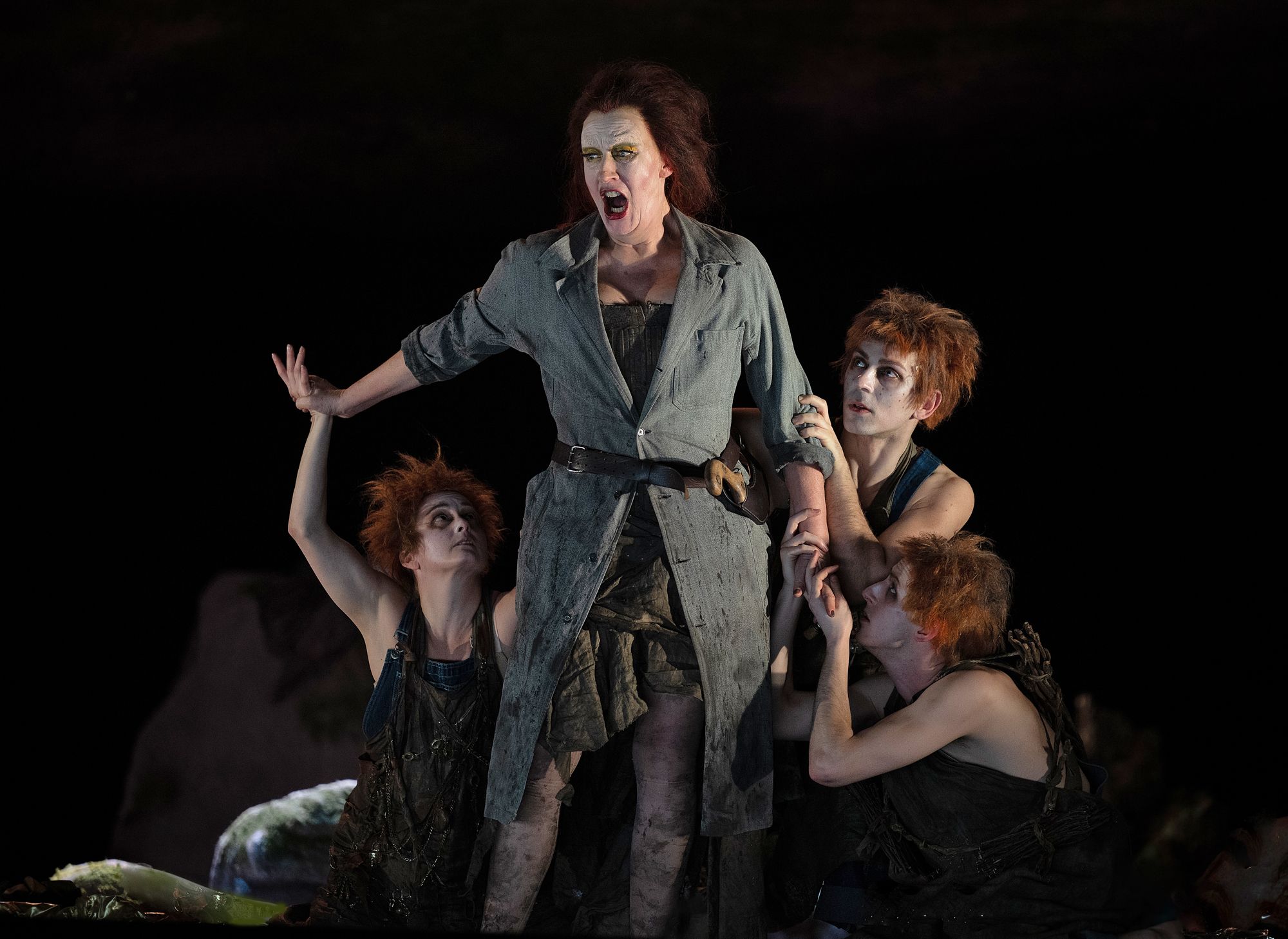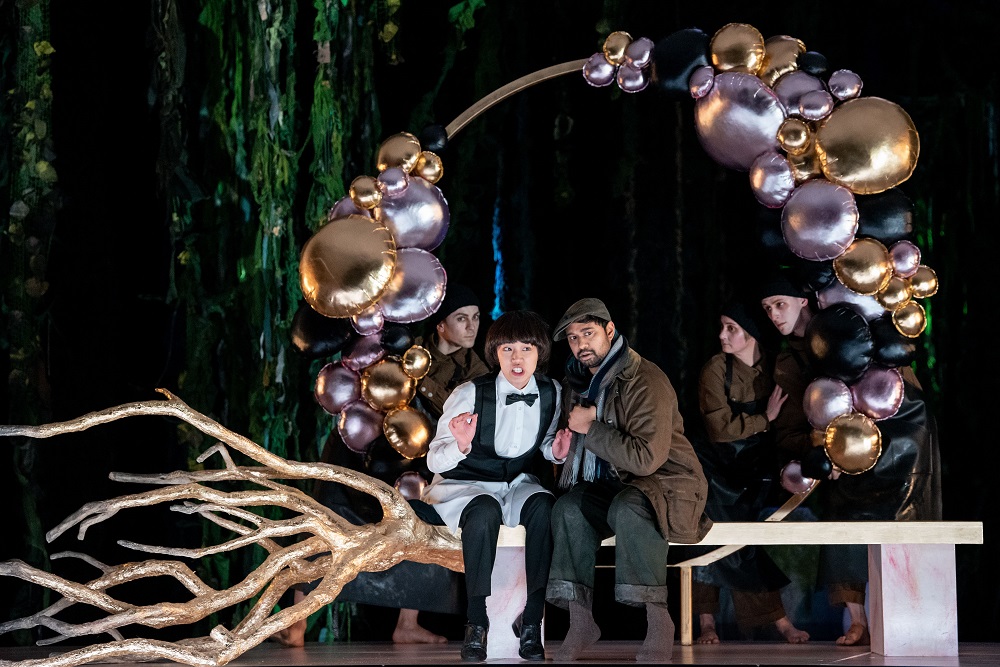Rusalka, Royal Opera review - ravishing sounds, torpid staging | reviews, news & interviews
Rusalka, Royal Opera review - ravishing sounds, torpid staging
Rusalka, Royal Opera review - ravishing sounds, torpid staging
Fine musicianship undermined by too little meaning and motivation in the production

Psychological depths in the myth of the water nymph who yearns for the human world, with disastrous results, have led to some unusual settings for Dvořák’s operatic masterpiece on the theme: a nursery, a hotel room (both successful), a brothel (not so much). What, though, when a production returns to the fairy-tale, developing at the same time the ecological devastation implied in the opera?
Well, Melly Still at Glyndebourne did just that - and without featuring what looks here like the filthy underside of a toilet seat in the deracinated setting of the third act. It’s difficult for those of us seriously in love with her take to warm to a similar but far less vivid one from directors Natalie Abrahami and Ann Yee (who also choreographs). The start is so meltingly full of promise: translucent heartbreak from the Royal Opera Orchestra under Semyon Bychkov, then a vision of Rusalka swimming with the Prince who’s been drawn to the forest pool where she lives. The recurrences of the water ballet at the beginning and end of the third act are also beautiful to look at. The rest, not so much. Those of us who remember Still’s feral, romping Wood Spirits can’t be satisfied with the three and their pallid dance doubles here (Vuvu Mpofu, Gabriele Kupšyte and Anne Marie Stanley pictured below by Bill Knight with Aleksei Isaev as the Water Goblin).  Their costumes, and the cloaks of Rusalka and her father the Water Goblin, resonantly sung by Aleksei Isaev but totally devoid of any characterisation, took me back to a kitschy Soviet-era Prague production. The dressing-up, by Annemarie Woods, doesn’t get better; Chloe Lamford’s sets in the outer acts show a fantasy natural world – using sustainable materials, like Still's also problematic Glyndebourne production of Smyth's The Wreckers – despoliated by the time of Rusalka’s fall, which is fine; the middle act crams the Prince’s palace into two rectangles, not so good (though the dancing is better here – and I liked the idea of witch Ježibaba, Rothbart-like, having a hand in the black-clad malevolence of the court). The constant success in the look of it all is the hugely experienced Paule Constable’s lighting, catching opalescent gleams in the depths of the forest and ideal near-darkness for the underwater prefaces and epilogue.
Their costumes, and the cloaks of Rusalka and her father the Water Goblin, resonantly sung by Aleksei Isaev but totally devoid of any characterisation, took me back to a kitschy Soviet-era Prague production. The dressing-up, by Annemarie Woods, doesn’t get better; Chloe Lamford’s sets in the outer acts show a fantasy natural world – using sustainable materials, like Still's also problematic Glyndebourne production of Smyth's The Wreckers – despoliated by the time of Rusalka’s fall, which is fine; the middle act crams the Prince’s palace into two rectangles, not so good (though the dancing is better here – and I liked the idea of witch Ježibaba, Rothbart-like, having a hand in the black-clad malevolence of the court). The constant success in the look of it all is the hugely experienced Paule Constable’s lighting, catching opalescent gleams in the depths of the forest and ideal near-darkness for the underwater prefaces and epilogue.
Act One is soporific here, despite the instant engagement of Asmik Grigorian’s Rusalka and the magisterial presence of Sarah Connolly as Ježibaba, no malevolent crone but a proud she-devil redhead (repurposed in the cast list as "a wise, eternal spirit"). Grigorian’s pure lyric soprano eventually rises to bigger vocal demands by sheer force of dramatic personality, and her artistry is undoubted, though for the first time ever seeing this opera I wasn’t moved, least of all by the celebrated Song to the Moon; Bychkov rather draws attention to the flexibility of his conducting, though he makes sure by clear signs to the stage that the singers go with him, and the woodwind solos often doubling the voice are ravishingly beautiful. Connolly (pictured below by Bill Knight with attendant little devils) comes into her own in the third act, lustrously commanding. So too does David Butt Philip, our very own tenor hitting the world stage this season with a crazy abundance of roles. He’s under-directed in Act Two, and there are moments of upper-register bottling which I hope don’t spell trouble ahead, but he has no problem with producing the richest low and high tones in the hypnotic final duet, one of the great operatic endings.
So too does David Butt Philip, our very own tenor hitting the world stage this season with a crazy abundance of roles. He’s under-directed in Act Two, and there are moments of upper-register bottling which I hope don’t spell trouble ahead, but he has no problem with producing the richest low and high tones in the hypnotic final duet, one of the great operatic endings.
Emma Bell just about gets away with what’s needed for the passionate Foreign Princess (here described as a Duchess, "the Prince’s political equal"). It’s good to see and hear so many excellent young singers, two of them on the Royal Opera's Jette Parker Young Artists programme, in smaller but far from negligible roles. All deserve a mention: Ross Ramgobin and Hogni Wu providing light relief, nimbly supported by Bychkov and the orchestra, as forester and servant (pictured below by Bill Knight); Josef Jeongmeen Ahn, resonant offstage in the huntsman’s song; Vuvu Mpofu, Gabriele Kupšyte and Anne Marie Stanley as the Wood Spirits, vocally lustrous if dramatically underused (and surely if nature is deracinated all around them in Act Three, these dryads should have lost their bobbly green?)  We may have been spoiled by the absolute dramatic purpose of every move in Richard Jones’s truly offbeat take on Wagner’s The Rhinegold over at ENO, but there really isn’t enough focused energy in the direction here, and no amount of good singing and great conducting can disguise that.
We may have been spoiled by the absolute dramatic purpose of every move in Richard Jones’s truly offbeat take on Wagner’s The Rhinegold over at ENO, but there really isn’t enough focused energy in the direction here, and no amount of good singing and great conducting can disguise that.
The future of Arts Journalism
You can stop theartsdesk.com closing!
We urgently need financing to survive. Our fundraising drive has thus far raised £49,000 but we need to reach £100,000 or we will be forced to close. Please contribute here: https://gofund.me/c3f6033d
And if you can forward this information to anyone who might assist, we’d be grateful.

Subscribe to theartsdesk.com
Thank you for continuing to read our work on theartsdesk.com. For unlimited access to every article in its entirety, including our archive of more than 15,000 pieces, we're asking for £5 per month or £40 per year. We feel it's a very good deal, and hope you do too.
To take a subscription now simply click here.
And if you're looking for that extra gift for a friend or family member, why not treat them to a theartsdesk.com gift subscription?
more Opera
 Cinderella/La Cenerentola, English National Opera review - the truth behind the tinsel
Appealing performances cut through hyperactive stagecraft
Cinderella/La Cenerentola, English National Opera review - the truth behind the tinsel
Appealing performances cut through hyperactive stagecraft
 Tosca, Royal Opera review - Ailyn Pérez steps in as the most vivid of divas
Jakub Hrůša’s multicoloured Puccini last night found a soprano to match
Tosca, Royal Opera review - Ailyn Pérez steps in as the most vivid of divas
Jakub Hrůša’s multicoloured Puccini last night found a soprano to match
 Tosca, Welsh National Opera review - a great company reduced to brilliance
The old warhorse made special by the basics
Tosca, Welsh National Opera review - a great company reduced to brilliance
The old warhorse made special by the basics
 BBC Proms: The Marriage of Figaro, Glyndebourne Festival review - merriment and menace
Strong Proms transfer for a robust and affecting show
BBC Proms: The Marriage of Figaro, Glyndebourne Festival review - merriment and menace
Strong Proms transfer for a robust and affecting show
 BBC Proms: Suor Angelica, LSO, Pappano review - earthly passion, heavenly grief
A Sister to remember blesses Puccini's convent tragedy
BBC Proms: Suor Angelica, LSO, Pappano review - earthly passion, heavenly grief
A Sister to remember blesses Puccini's convent tragedy
 Orpheus and Eurydice, Opera Queensland/SCO, Edinburgh International Festival 2025 review - dazzling, but distracting
Eye-popping acrobatics don’t always assist in Gluck’s quest for operatic truth
Orpheus and Eurydice, Opera Queensland/SCO, Edinburgh International Festival 2025 review - dazzling, but distracting
Eye-popping acrobatics don’t always assist in Gluck’s quest for operatic truth
 MARS, Irish National Opera review - silly space oddity with fun stretches
Cast, orchestra and production give Jennifer Walshe’s bold collage their all
MARS, Irish National Opera review - silly space oddity with fun stretches
Cast, orchestra and production give Jennifer Walshe’s bold collage their all
 Káťa Kabanová, Glyndebourne review - emotional concentration in a salle modulable
Janáček superbly done through or in spite of the symbolism
Káťa Kabanová, Glyndebourne review - emotional concentration in a salle modulable
Janáček superbly done through or in spite of the symbolism
 Buxton International Festival 2025 review - a lavish offering of smaller-scale work
Allison Cook stands out in a fascinating integrated double bill of Bernstein and Poulenc
Buxton International Festival 2025 review - a lavish offering of smaller-scale work
Allison Cook stands out in a fascinating integrated double bill of Bernstein and Poulenc
 Tosca, Clonter Opera review - beauty and integrity in miniature
Happy surprises and a convincing interpretation of Puccini for today
Tosca, Clonter Opera review - beauty and integrity in miniature
Happy surprises and a convincing interpretation of Puccini for today
 Hamlet, Buxton International Festival review - how to re-imagine re-imagined Shakespeare
Music comes first in very 19th century, very Romantic, very French operatic creation
Hamlet, Buxton International Festival review - how to re-imagine re-imagined Shakespeare
Music comes first in very 19th century, very Romantic, very French operatic creation
 Falstaff, Glyndebourne review - knockabout and nostalgia in postwar Windsor
A fat knight to remember, and snappy stagecraft, overcome some tedious waits
Falstaff, Glyndebourne review - knockabout and nostalgia in postwar Windsor
A fat knight to remember, and snappy stagecraft, overcome some tedious waits

Add comment